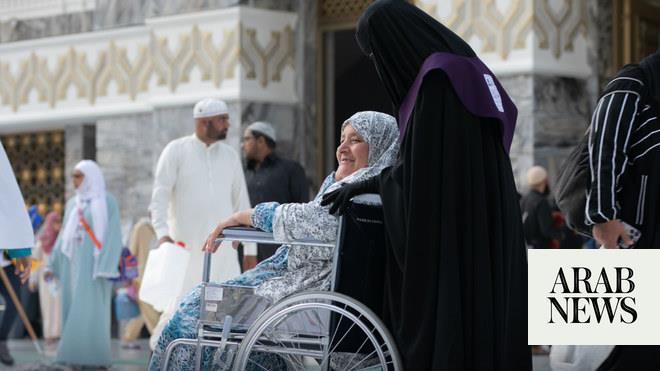
The program has assigned volunteers of both genders to different locations based on their skills and experience, and is part of the Vision 2030 plan to encourage young people to join voluntary programs
The “Be Helpful” initiative, which is run under the Hajj Ministry, has helped young people serve pilgrims in this year’s Hajj.
The program has assigned volunteers of both genders to different locations based on their skills and experience, and is part of the Vision 2030 plan to encourage young people to join voluntary programs.
Roya Redah Tambosi has set a good example for volunteers. The 30-year-old mother-of-four left her children behind to work voluntarily for pilgrims in the holy sites. Her husband was also stationed at Muzdalifah as a security man, so the couple relied on their 12-year-old daughter, Hoor, to look after the children.
It is the first time Tambosi has been able to get away from her youngsters for a noble duty. However, she is determined to do it again for the next year’s Hajj, and burden Hoor once more. The latter will surely become a good caring mother.
When she was young, Tambosi told Arab News, her family used to take her to the mosque to help them distribute food and water to pilgrims during Hajj.
This might have been the seed of humanity Tambosi’s family had planted in her heart.
Tambosi is now a leader at Be Helpful, one of the many initiatives the Hajj Ministry has supported and adopted. She is a new media supervisor overseeing team field tasks.
Tambosi recalled a rescue case she witnessed during the Hajj, an incident that made her feel that what she was doing is purely human.
“A female pilgrim suffering from hyperthermia was brought in on a stretcher. It was the first time I had seen an unconscious person. If rescuing procedures had not been provided for minutes, the woman would have died. In fact, that experience made me strongly believe in what we are doing. It was like seeing a dead person come back to life again,” she said.
“Our initiative has four teams as we have four main programs within the initiative. These are health, translation and guidance, new media and educational programs,” Tambosi explained.
Tambosi added that each field team consists of a physician, a savior, two people whose job is to document trips, and a leader.
“Seven teams left this afternoon to help pilgrims. They get back to the camp an hour before midnight,” she said.
Another female volunteer, Sumaiyah Hafiz, told Arab News her work in the initiative had taught her how to work within a team and how better to serve pilgrims from all walks of life.
“It has taught me how to work in a mixed environment where both genders confidently cooperate to give a service. We also succeeded in acclimatizing ourselves to working with strangers, people at the workplace who we knew nothing about before. This has also added to our experience,” Hafiz said.
According to the executive director of the initiative, Hani Abu Al-Saud, the idea started with the
aim of institutionalizing the voluntary work provided to worshippers, not only during Hajj but also to Umrah performers throughout the year.
Handy services
The idea came about to voluntarily provide the guests of Allah with different services they may need when they performed their rituals. He pointed out that some 185 volunteers of both genders took part in the initiative. He noted that 537 pilgrims had benefited from their medical clinic.
“Some 414 pilgrims have taken advantage of the services of our ambulatory emergency teams, while more than 1,240 other pilgrims have done well from of our translation and guidance services,” he said.
The teams have given more than 160,000 gifts to pilgrims this year, according to Al-Saud.












